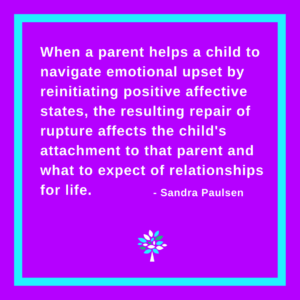Quote by Sandra Paulsen

One of the most important tests of any relationship is how we handle relational rupture, upset or disagreement. Being able to repair that rupture is a powerful way to further develop the relationship.
The expectations a person has on how this repair is going to go is based on unconscious templates from infancy in how they were soothed, or not, by a primary care taker.
In that primary attachment relationship, it is the care taker’s responsibility to help the infant return to a baseline level of emotion after being upset. Sometimes this takes the form of rocking the child and saying soothing things, sometimes this might be reengaging the attachment circuit by gazing in the eyes and cooing, sometimes it is tickling to elicit a smile and laughter.
But if these things aren’t done on a consistent basis to help the infant learn that their care taker is reliable, that they are loved and can expect help when distressed, then this is what they learn about relationships and forms the template for their expectations of all future relationships.
This attachment trauma occurs before language, before memory and so is often not acknowledged as a formative experience when someone is looking back over their life or sharing it with a therapist.
Regardless of whether this information is accessible in that way, it continues to exert a powerful effect on the individual unless they are lucky enough to have a corrective emotional experience with someone else in later life, or if they get themselves into therapy and help themselves change their narratives and beliefs.










